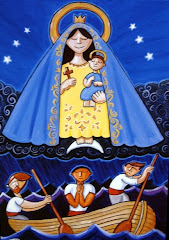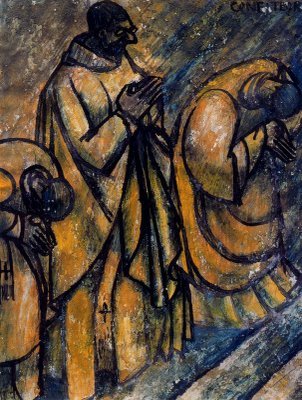
April 24
The Holy Father, Benedict XVI, on his pastoral visit to the Italian city of
First conversion :
Of the first of these the Holy Father says: "The first fundamental conversion was the interior road to Christianity, toward the 'yes' of faith and baptism,"
Holy Father explained further that St.Augustine "was always tormented by the question of truth. He wanted to find truth," .
"He always believed -- sometimes rather vaguely, sometimes more clearly -- that God exists and takes care of us, but to truly know this God and Jesus Christ and come to say 'yes' to him with all the consequences this entails -- this was the great interior struggle of his youth.”
"He tells us” the Holy father says of St. Augustine “that, by means of Platonic philosophy, he accepted and recognized that 'in the beginning was the Word,' the Logos, creative reason. But philosophy did not show him any road to reach this Word; this Logos remained distant and intangible. Only in the faith of the Church did he find the second essential truth: The Word was made flesh. And in this way he touches us and we touch him."
Augustine's second conversion explains the Pope, “took place after his baptism in Hippo, in
Second conversion
The Holy Father continues: "The beautiful dream of the contemplative life disappeared, Augustine's life fundamentally changed. Now he had to live with Christ for all. He had to translate his knowledge and sublime thoughts into the thought and language of the simple folk of his city. The great philosophical work of a lifetime, which he had dreamed of, remained unwritten. In its place we were given the gift of something more precious: the Gospel translated into the language of daily life."
"This was the second conversion that this man, struggling and suffering, had to undergo," the Pope added. "He must always be there for everyone; always with Christ he must give his own life so that others might find Christ, the true Life."
Third conversion
The Holy Father adds that St. Augustine came to understand that "the whole Church -- all of us, including the apostles -- must pray every day: Forgive us our trespasses as we forgive those who trespass against us.”
"Augustine saw the final step of humility,” said the Pope, “not only the humility of inserting his great thought into the faith of the Church, not only the humility of translating his great knowledge into the simplicity of proclamation, but also the humility of recognizing that the merciful goodness of a God who forgives was necessary for him and the whole pilgrim Church. We make ourselves resemble Christ, the perfect one, to the greatest extent possible, when we become merciful persons like him."
The Holy Father concluded with this exhortation: "In this hour let us thank God for the great light that radiates from the wisdom and humility of


No comments:
Post a Comment